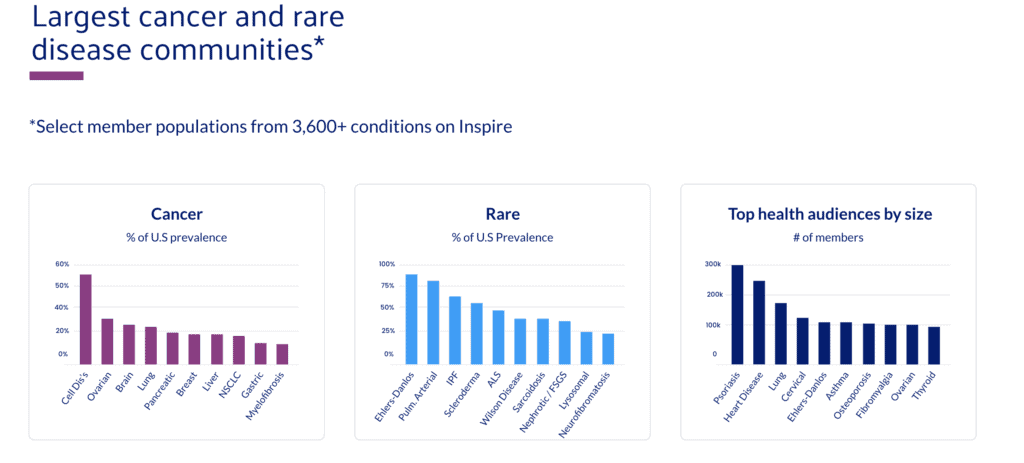[vc_row][vc_column][mpc_textblock content_width=”100″ font_preset=”preset_0″ margin_divider=”true” margin_css=”margin-top:20px;margin-bottom:20px;”]Recruiting Rare and Oncological Patients? Top Pharma Turns to Inspire[/mpc_textblock][vc_row_inner][vc_column_inner][mpc_image image=”12781″ image_size=”large” force_fullwidth=”true” image_opacity=”100″ image_inner_border_gap=”0″ effect=”none” image_hover_opacity=”100″][/vc_column_inner][/vc_row_inner][mpc_textblock content_width=”100″ font_preset=”preset_2″ margin_divider=”true” margin_css=”margin-top:20px;margin-bottom:20px;”]By Jeff Terkowitz
Did you know that 80 percent of Inspire’s members agreed to receive information from Inspire about clinical trials? That’s about 1.6 million members with conditions in oncology, rare diseases, autoimmune disorders and chronic conditions who want to know if and when trials affecting their condition might be recruiting.
Pfizer needed to find rare patients with genetic resilience to lung cancer. On Sept 23, the Breakthrough Staff at Pfizer wrote,
Normally, discovering a small cohort or one or two families who meet such criteria might take years — if you could find them at all. But with the Inspire platform, which includes nearly two million members and volunteers, researchers were able to identify over a hundred participants who fit the criteria in a few weeks. 1
Patients at Inspire are already appropriately consented and eager to participate in research.
Meeting recruitment goals remains a long-standing obstacle to successful and timely clinical trials. A 2019 study published in the Journal of Clinical Oncology identified specific obstacles causing delays in fulfillment, where they identified lack of awareness as the first barrier in recruitment and accrual for clinical trials. In addition to awareness, barriers exist in three other steps: Identifying eligible patients; explaining standard treatment and trial options to patients; and completing enrollment.2
The traditional model of recruitment relies on clinicians. Yet, physicians may or may not offer a trial as a treatment option due to a lack of time, energy, or incentives. Concerns that a clinical trial will interfere with the physician-patient relationship, issues around reimbursement, or even treatment preferences have been uncovered as reasons for clinicians being unaware of or resistant to referring patients to clinical trials.3 But these concerns might not be barriers for the patients.
Inspire’s Virtual Patient Communities
The patients researchers seek are online looking for help. Last year, Google reported that 70,000 health-related searches occur each minute of every day.4 Over 50 million visitors found Inspire through these searches. Results of a survey of over 9000 Inspire members found that 99 percent of respondents independently research their own condition, and 88 percent use social media for medical research. This survey also found that many patient members expressed interest in clinical trial participation; 21 percent had proactively asked their doctor about clinical trials.5
Over the past two years, Inspire has been implementing what is being called “a new paradigm”6 for clinical trial recruitment that directly reaches specific members.
Inspire’s model differs from the model traditional patient recruitment companies typically use. Patient recruitment companies depend on massive generalized databases of names. Inspire is not that kind of company. Inspire doesn’t send broad email blasts to a database of names who may or may not have the condition specified for the clinical trial. Inspire is a community of patients with specific conditions.
For example, in one recent clinical trial awareness campaign, Inspire obtained an email open rate of 30%, far above the industry average for sponsors who just send out a generic email. Perhaps this is because Inspire has a 15-year history of relationships with members and has become a familiar and reliable resource.
The new paradigm doesn’t stop at the open rate: Inspire’s trained clinical managers reach out directly to members who click a “learn more” button on an email. They engage in conversations to help escort and support members through the enrollment process, another traditional barrier. Potential participants value this kind of personal help. This step in the recruitment process helps to support the conversion of an Inspire member to an enrolled patient for a clinical trial.
While most patient recruitment companies do not specialize in rare disease, Inspire has some of the largest populations of oncological and rare disease communities around. Inspire’s years-long partnerships with patient advocacy groups also facilitate the patient recruitment process. Further, Inspire’s years as a virtual company give it a long head start in implementing virtual options during a time of social distancing and COVID-19.

Though trial awareness is a first step, Inspire also delivers full service patient recruitment with screened patients. From awareness through enrollment and retention, Inspire is the answer for clinical trial recruitment.
[/mpc_textblock][/vc_column][/vc_row][vc_row css=”.vc_custom_1483606399832{padding-top: 20px !important;padding-bottom: 20px !important;}”][vc_column][vc_row_inner css=”.vc_custom_1496685033252{padding-bottom: 40px !important;}”][vc_column_inner width=”1/2″][mpc_textblock content_width=”100″ font_preset=”preset_2″ margin_divider=”true” margin_css=”margin-top:20px;margin-bottom:20px;”]Download the live virtual roundtable recording, “Patient Reflections on Their Journey: How Social Media Health Communities Affect Their Experiences”
[/mpc_textblock][mpc_button preset=”preset_1″ block=”true” url=”url:https%3A%2F%2Fcorp.inspire.com%2Fpatient-reflections-on-their-journey-how-social-media-health-communities-affect-their-experiences%2F|title:Patient%20Reflections%20on%20Their%20Journey%3A%20How%20Social%20Media%20Health%20Communities%20Affect%20Their%20Experiences|target:_blank” font_preset=”preset_1″ font_color=”#ffffff” font_transform=”none” font_align=”center” title=”Download this recording” icon=”fa fa-angle-right” icon_color=”#ffffff” icon_size=”14″ icon_effect=”stay-left” icon_gap=”20″ background_color=”#084a8e” border_css=”border-radius:2px;” padding_divider=”true” padding_css=”padding-top:10px;padding-right:20px;padding-bottom:10px;padding-left:20px;” margin_divider=”true” margin_css=”margin-top:30px;” hover_font_color=”#ffffff” hover_icon_color=”#ffffff” hover_background_color=”#116eba”][/vc_column_inner][vc_column_inner width=”1/2″][mpc_image image=”12750″ image_link=”url:https%3A%2F%2Fcorp.inspire.com%2Fresource%2Fpatient-reflections-on-their-journey-how-social-media-health-communities-affect-their-experiences%2F|title:Patient%20Reflections%20on%20Their%20Journey%3A%20How%20Social%20Media%20Health%20Communities%20Affect%20Their%20Experiences” image_size=”large” image_opacity=”100″ image_inner_border_gap=”0″ effect=”none” image_hover_opacity=”100″][/vc_column_inner][/vc_row_inner][flipbook-shelf ids=”humanizing_the_brand_experience, insights_from_engaged_patients, expert_by_experience_2016, expert_by_experience_2015, expert_by_experience_2014, case_studies_using_multimodal_research, case_study_prostate_cancer_consumer_support_group_survey, case_study_sleep_disorders_private_research_community”][mpc_callout layout=”style_8″ title_font_preset=”preset_5″ content_width=”100″ content_font_preset=”preset_2″ icon_disable=”true” background_color=”#e8e8e8″ border_css=”border-width:5px;border-color:#d3d3d3;border-style:solid;” padding_css=”padding:15px;” mpc_button__preset=”preset_1″ mpc_button__block=”true” mpc_button__url=”url:%2Fresources|||” mpc_button__font_preset=”preset_1″ mpc_button__font_color=”#ffffff” mpc_button__font_transform=”none” mpc_button__font_align=”center” mpc_button__title=”Learn More” mpc_button__icon=”fa fa-angle-right” mpc_button__icon_color=”#ffffff” mpc_button__icon_size=”14″ mpc_button__icon_effect=”stay-left” mpc_button__icon_gap=”20″ mpc_button__background_color=”#47aff3″ mpc_button__border_css=”border-radius:2px;” mpc_button__padding_divider=”true” mpc_button__padding_css=”padding-top:10px;padding-right:20px;padding-bottom:10px;padding-left:20px;” mpc_button__margin_divider=”true” mpc_button__margin_css=”margin-top:10px;” mpc_button__hover_font_color=”#ffffff” mpc_button__hover_icon_color=”#ffffff” mpc_button__hover_background_color=”#116eba”]Inspire offers a trusted community to patients and caregivers. Our goal with this blog, this website and our content is to provide the life science industry access to the true, authentic patient voice. In so doing, we support faithful operationalization of patient-centricity. Take a look at our case studies, eBooks and news outlet coverage.[/mpc_callout][/vc_column][/vc_row][vc_row][vc_column][mpc_textblock content_width=”100″]References:
1 The Breakthrough Staff (Sept 23, 2020). Empowering people with supergenes to help unlock new treatment pathways. https://www.breakthroughs.com/health-tomorrow/empowering-people-super-genes-help-unlock-new-treatment-pathways.
2Lee S., Murphy C., Geiger,A. et al (2019). Conceptual model for accrual to cancer clinical trials. Journal of Clinical Oncology, 37:23, 1993-1996. doi/full/10.1200/JCO.19.00101
3Fogel D. (2018). Factors associated with clinical trials that fail and opportunities for improving the likelihood of success: A review.Contemporary Clinical Trials Communications, 11, 156-164.doi.org/10.1016/j.conctc.2018.08.001
4 Drees, J. (2019). Google receives more than one billion health questions every day. The Becker’s Hospital Review. https://www.beckershospitalreview.com/healthcare-information-technology/google-receives-more-than-1-billion-health-questions-every-day.html
5 Eccard, H. (2019). Insights from engaged patients: An analysis of the fourth annual survey, Inspire. https://corp.inspire.com/resources/ebook/fourth-annual-survey.
6Mesita, E. (2020). An ALS trial changes the patient recruitment paradigm. Clinical Leader. https://www.clinicalleader.com/doc/an-als-trial-changes-the-patient-recruitment-paradigm-0001
[/mpc_textblock][/vc_column][/vc_row][vc_row][vc_column][vc_column_text]
[/vc_column_text][/vc_column][/vc_row]